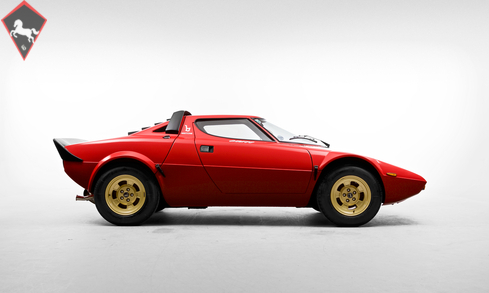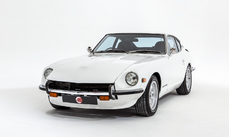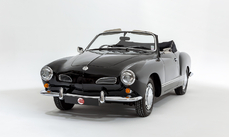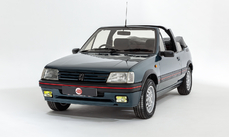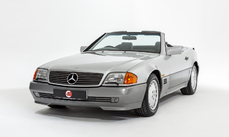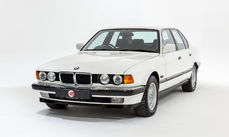Lancia Stratos HF 1977
Allgemeine Beschreibung :
One of just 492 Stratos HFs, fully restored and with 62k miles.
MODEL HISTORY
The Lancia Stratos HF (Tipo 829), widely and more simply known as Lancia Stratos, started production in 1973 and went on to become a very successful and iconic rally car, winning the World Rally Championship in 1974, 1975 and 1976. It was the first design project between Bertone and Lancia, who where well known for their design links with Pininfarina. Built as a Rally car to replace the Lancia Fulvia, the Stratos was based on the designs of Bertone's Marcello Gandini who also designed the Lamborghini Miura and Countach.
During early production it was decided to use a Ferrari Dino V6, however, Enzo Ferrari initially was not in agreement of this as he saw it as competition to his own Dino V6. Eventually when the production of the Dino ended Enzo Ferrari agreed on delivering 500 units to Lancia.
The Stratos was a very successful rally car during the 1970s and early 1980s. It started a new era in rallying as it was the first car designed from scratch for this kind of competition. The three leading men behind the entire rallying project were Lancia team manager Cesare Fiori, British racer/engineer Mike Parkes and factory rally driver Sandro Munari.
The car won the 1974, 1975 and 1976 Championships in the hands of Munari and Björn Waldegård, and might have gone on to win more had not internal politics within the Fiat group placed rallying responsibility on the Fiat 131 Abarths. As well as victories on the 1975, 1976 and 1977 Monte Carlo Rally, all courtesy of Munari, the Stratos won the event with the private Chardonnet Team as late as 1979.
Equipment
14-inch Campagnolo alloy wheels, Klippan harnesses, Sun visors, Heater, Roof spoiler, Rear spoiler, Rear window louvres, Electrical kill switch, Spare wheel.
EXTERIOR
The classic wedge styling of the Stratos still remains truly striking. The body presents as new throughout having been fully repainted to a very high standard by The Classic Car Workshop in 2015. Lancia specialists, Walkers Garage Ltd, oversaw the car's complete and thorough restoration and the result is one exceptional Stratos.
The body panel numbers are still visible inside the front clam and door shuts, and both the front and rear panels show no signs of any historical damage. The correct Stratos and Bertone decals have been freshly applied, and all trim pieces appear as new. The window louvers, roof and boot spoilers are also in excellent condition.
Chassis number: 829ARO 001744Body number: 1240 252
INTERIOR
The compact interior remains in very good condition with a lovely patina throughout. The black vinyl dash, headlining, and fawn suede seats are original and show no signs of excessive wear. Furthermore the dials and switchgear are all correct and operating exactly as they should with no electrical issues.
ENGINE & TRANSMISSION
Lifting the large rear shell reveals the wonderful Dino V6 power plant. In June 2015 the current owner spent over £14,000 with Walkers Garage to rectify any issues that were discovered after a full inspection and check over.
The work included but was not limited to: new hoses, brake and clutch lines, suspension refurbishment, oil service and filter replacement, airbox and header tank refurbishment, rolling road test and carb set up, new ignition system and sports coil, plus the fitting of bespoke stainless steel silencers and pipes. The gearbox also received treatment including new seals and fresh oil.
Engine number: 829A 000 001097
WHEELS, TYRES & BRAKES
The Stratos sits on the original 14-inch Campagnolo alloy wheels, finished in striking gold paint with the correct domed wheel nuts fitted. The alloys have been recently refurbished and look exceptional. Walkers Garage fitted a brand new set of Michelin XWX classic tyres last year and also replaced the brake lines and master cylinder.
HISTORY FILE
As one of only 492 Stratos HFs manufactured, this example was first registered in Austria on 17th April 1977. It was later imported to the UK in 2001 where its new owner would keep the car for the next thirteen years before it changed hands again in 2014. The current mileage of 100,994km is believed genuine.
Present in the history file is the UK V5C showing just two keepers. Also present are the original Austrian ownership documents that confirm the vehicle to be ‘matching numbers'. An invoice from Walkers Garage for the extensive work carried out completes the paperwork.
http://www.4starclassics.com/lancia-stratos-hf-for-sale/
1977 Lancia Stratos HF is listed verkauft on ClassicDigest in Kingsley by 4 Star Classics for £449995.
Fakten der Auto
Karosserietyp : Auto Marke : Lancia Modell : Stratos Ausführung : HF Hubraum : 2.4 Modelljahr : 1977 Karosstyp : Rasse/Rallye-Auto Lage : Hampshire
Verkauft
Angaben Zum Verkäufer
Verkauft
Other cars listed for sale by this dealer
über Lancia
Ah, Lancia, die italienische Marke, die auf dem schmalen Grat automobiler Brillanz getanzt hat! Lass mich dich auf eine Reise durch die fesselnde Geschichte von Lancia mitnehmen, einer Marke, die Leidenschaft, Innovation und Rallye-Erfolg verkörpert.Akt 1: Die Frühen Jahre (1906-1920er)
Lancia wurde 1906 von Vincenzo Lancia gegründet, einem Ingenieursgenie mit einer Vorliebe für das Außergewöhnliche. Die Marke erlangte schnell einen Ruf für ihre präzise Ingenieurskunst und innovative Herangehensweise. Der Lancia Alpha, 1907 eingeführt, war das erste Auto mit einem schmalen V4-Motor und setzte den Ton für Lancias Einsatz für technische Exzellenz.
Akt 2: Innovation im Zentrum (1930er-1950er)
Die 1930er Jahre sahen Lancia die Grenzen der Innovation mit Modellen wie dem Lambda ausloten, dem ersten Auto mit selbsttragender Monocoque-Chassis. Der in den 1930er Jahren eingeführte Aprilia präsentierte wegweisende Aerodynamik und einen V4-Motor und festigte Lancias Ruf als Pionier.
Akt 3: Eleganz der Nachkriegszeit (1950er-1960er)
Nach dem Zweiten Weltkrieg begeisterte Lancia weiterhin mit Modellen wie dem Aurelia, dem ersten Serienauto mit einem V6-Motor. Es verband Leistung mit Komfort und Eleganz. Der Flaminia folgte und verkörperte Luxus und fortschrittliche Technik.
Akt 4: Rallye-Dominanz (1970er-1980er)
Lancia hat sich mit einer beispiellosen Rallye-Geschichte einen Platz in der Motorsportgeschichte gesichert. Der Lancia Stratos, ein keilförmiges Wunder, dominierte die Rallyeszene in den 1970er Jahren und holte von 1974 bis 1976 drei aufeinanderfolgende Rallye-Weltmeisterschaften. Der Delta Integrale, in den 1980er Jahren eingeführt, setzte diese Rallye-Herrschaft mit mehreren Meisterschaften fort.
Akt 5: Herausforderungen und Widerstandsfähigkeit (1990er-2000er)
Das späte 20. Jahrhundert brachte finanzielle Herausforderungen für Lancia mit sich, was zu Zusammenarbeiten mit anderen Automobilherstellern führte. Trotz der Schwierigkeiten führte Lancia Modelle wie den Thesis und den Ypsilon ein, die den Einsatz für Stil und Substanz zeigten.
Akt 6: Neuerfindung im 21. Jahrhundert (2010er-Heute)
In den 2010er Jahren konzentrierte sich Lancia auf die Ypsilon als Hauptmodell, um die Markenstrategie neu auszurichten. Obwohl die Produktionszahlen zurückgingen, behielt die Marke ihren Ruf für unverwechselbares Design und Komfort bei.
Epilog: Ein Erbe von Leidenschaft und Innovation
Lancias Geschichte ist eine von Leidenschaft, Innovation und Motorsporterfolg. Die Marke, mit ihren bahnbrechenden Designs, technologischen Fortschritten und Rallyetriumphen, hat einen unauslöschlichen Eindruck in der Automobilwelt hinterlassen. Lancia mag in den letzten Jahren Herausforderungen gegenüberstehen, aber ihr Erbe lebt weiter, gefeiert von Enthusiasten, die die Magie in jedem Lancia-Werk erkennen
